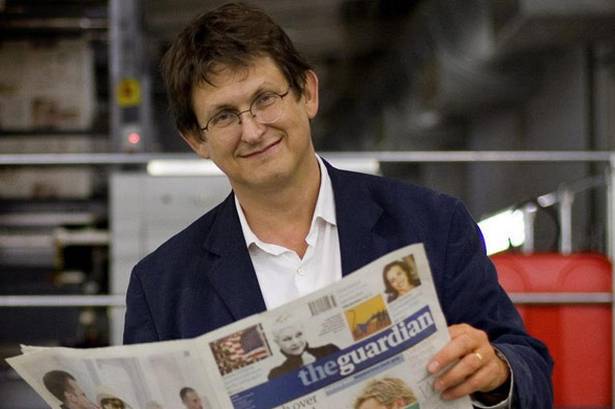In his latest compulsively readable GQ article, “What Does the Future Hold for the Guardian?” Michael Wolff analyzes the British publication’s attempt to globalize itself and win the United States, to less-than-mixed financial results. The Snowden story, as important as it may have been, could not be monetized, and the company continues to hemorrhage cash. Wolff finds the the Guardian’s singular editor, Alan Rusbridger, “unpleasant” in his lack of transparency, whereas Wolff is unpleasant for the opposite reason. An excerpt about Rusbridger, who, by virtue of the publication’s unusual financial arrangement, is a throwback to an earlier era:
“While the Guardian has a business staff with a CEO, and is overseen by trustees with ultimate responsibility, it has one real power centre, strategic thinker and moral compass: its editor, Alan Rusbridger. (A kind of preternatural consensus surrounds Rusbridger, but underneath him the Guardian is a fraught political cauldron, with underlings struggling to align with him, stay in his favour and undercut everyone else who is trying: ‘a nest of vipers,’ in the description of an outside consultant brought in to work on one of the paper’s big redesign projects.)
The 60-year-old Rusbridger is, surely, among the most talented newspaper editors of his generation (the other, at the opposite end of the news and philosophical spectrum, is Paul Dacre at the Daily Mail) and, as well, the most opaque, sending cryptic messages in a cipher which no one person can completely decode.
An hour with him is both unpleasant in the exertions required to penetrate his lack of transparency and fill the conversational void and, yet, at the same time, uplifting and restorative. The vacuum that surrounds him somehow seems to represent moral superiority and it draws you in. Six different people of high rank at the paper have said to me, on different occasions, the following words: ‘I would do anything for Alan.’ These are not words you usually hear in a modern company; they are not even credible. But they suggest the Guardian’s sense of purpose and the potency of its Kool-Aid. (I once sat next to Rusbridger’s wife at a Guardian dinner; she kept referencing what seemed like a wholly different person, a normal, fallible, workaday chap named ‘Al.’ Weird.)
His is an absolute, pre-modern sort of power, faith-based and exclusionary. You believe or you don’t. You are in or you are out. You are family or you are not. Emily Bell, once a potential Rusbridger successor, who was at the Guardian for the better part of two decades (coming in through the Guardian’s acquisition of the Observer- ever an unresolved relationship), told me, after she left several years ago to take a teaching position in the US, “I never really was an insider.”
Rusbridger has run the place since 1995 and, in some less-than-rational way, its future exists wholly in his head or at his whim. Not only is there enormous deference to him and dependence on him, but a sense of the abyss at any suggestion that he might leave (he is often suggested for eminent positions at places like the Royal Opera House).
Rusbridger has maintained two dominant ideas about the Guardian’s future: going digital and going to the US.”
Tags: Alan Rusbridger, Michael Wolff

